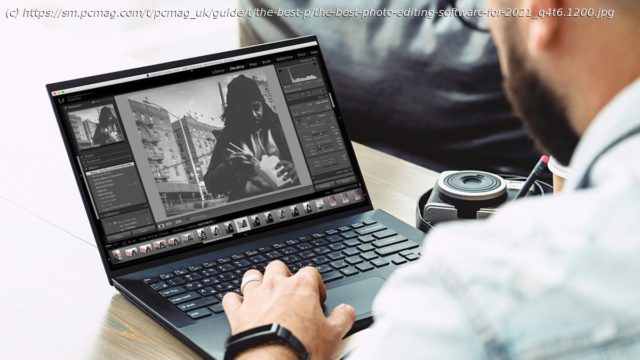Whether you’re a casual smartphone shooter or a professional using a high-end digital SLR, a photo app helps you get the most out of your images. Here’s the software that does best in our testing.
Whether you merely shoot with your smartphone or you’re a professional photographer working in a studio, you need software to organize, optimize, and edit your digital photos. Camera technology is improving at a tremendous rate: Today’s smartphones are more powerful than the point-and-shoots of just a few years ago, and pro-level cameras have passed the 150-megapixel mark. Photo editing software is keeping up, with ever-more-powerful features. People who shoot with a four-camera Galaxy S21 Ultra or with an advanced digital SLR both care how their photos look. To get the best results, you need to import the shots into your PC to organize them, pick the best ones, perfect them, and print or share them online. Here we present the best choices in photo editing software to suit every photographer. Which Photo Software Should You Use? Novice smartphone shooters want different software from those shooting with a $52,000 Phase One IQ4 in a studio. We’ve included all levels of PC software here, and reading the linked reviews will make it clear which is for you. Nothing says that pros can’t occasionally use an entry-level application or that a prosumer won’t be running Photoshop, the most powerful image editor around. The issue is that, in general, users at each of these levels will be most comfortable with the products intended for them. Note that, in the spec table below, it’s not a case of «more checks mean the program is better.» Rather, the table is designed to give you a quick overview of the products. A product with everything checked doesn’t necessarily have the best implementation of those features, and one with fewer checks still may be very capable, and whether you even need the checked feature depends on your photo workflow. For example, DxO Photolab may not have face recognition or keyword tagging, but it has the finest noise reduction in the land and some of the best camera- and lens-profile-based corrections. Are There Free Photo Editing Apps? So you’ve graduated from smartphone photography tools like those offered by the smartphone operating systems and maybe Instagram. Does that mean you have to pay a ton for high-end software? Absolutely not. Up-to-date desktop operating systems include photo software at no extra cost. The Microsoft Photos app included with Windows 10 (and updated for Windows 11) may surprise some users with its capabilities. In a touch-friendly interface, it offers a good level of image correction, auto-tagging, blemish removal, face recognition, and even raw camera file support. It can automatically create editable albums based on photos’ dates and locations. Apple Photos does those things too, though its automatic albums aren’t as editable. Both programs also sync with online storage services: iCloud for Apple and OneDrive for Microsoft. With both, you can search based on detected object types, like «tree» or «cat» in the application. Apple Photos also can integrate with plugins like the excellent Perfectly Clear. Ubuntu Linux users are also covered when it comes to free included photo software: They can use the capable-enough Shotwell app. And no discussion of free photo editing software would be complete without mentioning the venerable GNU Image Manipulation Program, better known as GIMP. It’s available for Windows, Mac, and Linux, offers a ton of Photoshop-style plugins and editing capabilities but very little in the way of creature comforts or usability. Other lightweight, low-cost options include Polarr and Pixlr. How Can You Edit Photos Online? In this roundup, we’ve only included installable computer software, but entry-level photo shooters may be adequately served by online photo-editing options. These are mostly free, and they’re often tied to online photo storage and sharing services. Flickr (with its integrated photo editor) and Google Photos are the biggest names here, and both can spiff up your uploaded pictures and do a lot to help you organize them. These free options even approach the two entry-level installed programs here, but they lack many tools found in the pro and enthusiast products.






